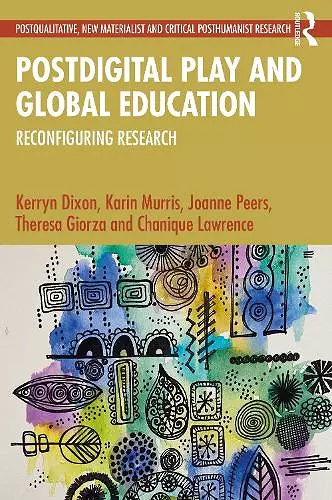Postdigital Play and Global Education
Reconfiguring Research
Karin Murris author Kerryn Dixon author Joanne Peers author Theresa Giorza author Chanique Lawrence author
Format:Paperback
Publisher:Taylor & Francis Ltd
Published:24th Sep '24
Currently unavailable, and unfortunately no date known when it will be back
This paperback is available in another edition too:
- Hardback£135.00(9781032070223)

Postdigital Play and Global Education: Reconfiguring Research is a re-turn to a large-scale, international project on children’s digital play. Adopting postqualitative and posthumanist theories, research practices are reconfigured all the way down from what counts as ‘data’, ‘tools’, ‘instruments’, ‘transcription’, research sites’, ‘researchers’, to notions of responsibility and accountability in qualitative research. Through a series of vignettes involving complex human and more-than-human collaborators (e.g., GoPros, octopus, avatars, diaries, sackball, LEGO bricks), the authors challenge who and what can be playful and creative across contexts in the global north and global south. The diffractive methodology enacted interrupts Western developmental notions of agency that are dominant in research involving young children.
The concept of ‘postdigital’ offers fresh opportunities to disrupt dominant understandings of children’s play. Play emerges as an enigmatic and shape-shifting human and more-than-human agentic force that operates beyond digital/non-digital, online/ offline binaries. By attuning to race, gender, age and language, invisible and colonising aspects of postdigital worldings the authors show how global education research can be reimagined through a posthumanist decentering of children without erasure.
Postdigital Play and Global Education puts into practice Karen Barad’s agential realism, but also a range of postdevelopmental and posthumanist writings from diverse fields. The book will be of particular interest to researchers looking for guidance to enact agential realist and posthumanist philosophies in research involving young children.
This book is a game changer for researchers drawing on postqualitative educational research in postdigital times. The authors have produced an exceptional storying of methodology and theory that opens thinking and practice. The same text also offers practical definitions and ways of working founded in the writings of known and new thinkers. Perhaps the book's greatest achievement is the decentering of western ways of knowing from the study of global children. A highlight is to read about children from the global south as children, not as deficit children or deficit Adults.
Professor Annette Woods, School of Early Childhood and Inclusive Education. Queensland University of Technology
Staying with the discomfort produced by having to conform to the requirements of a large-scale international research project, these researchers from the Global South re-turn to the data they collected. They show how data reveals itself differently in relation to posthuman, postdigital and decolonial theories. Concepts and methods relating to the Posts- are clearly explained and put to work, unsettling taken for granted assumptions about developmentalism, play and quantitative research methods. This opens the way for re-imaginings of research subjects, transcription, research sites and data analysis, in other words, for doing research differently. This accessible account is a must for scholars interested in undertaking postqualitative research.
Hilary Janks, Professor Emerita University of the Witwatersrand, South Africa
ISBN: 9781032070278
Dimensions: unknown
Weight: 500g
272 pages